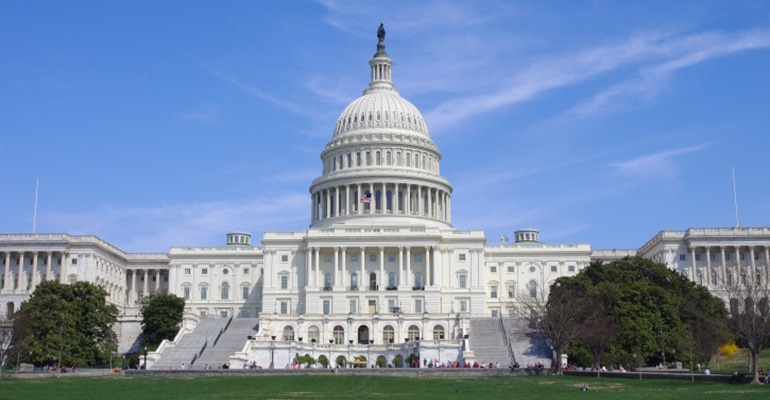Riders include no funds for USDA to relocate ERS and 180 days to issue new organic livestock rule.

The House appropriations subcommittee on agriculture, rural development, food and drug administration and related agencies approved its fiscal 2020 bill by voice vote on May 23. Total discretionary funding in the legislation is $24.310 billion, which is $1 billion above the fiscal 2019 enacted level. The bill next heads to the full committee for markup.
“We are proud that our first bill rejects the Administration’s drastic cuts and instead provides robust funding to assure that all Americans have access to safe, high-quality and low-cost food, medicine and medical devices,” subcommittee chairman Sanford Bishop Jr. (D., Ga.) said. “We increased funding for vital infrastructure in rural communities, including broadband, water and waste water and community facilities, and fund agricultural research that will keep American agriculture the best in the world.”
During the committee markup of the bill, Bishop stated, “During a time of great uncertainty due to tariffs and natural disasters, this bill provides $1.8 billion for farm programs, including $30 million to assist the implementation of the 2018 farm bill. It also prohibits the closure of county-level Farm Service Agency offices to ensure our farmers, ranchers and producers receive high-quality customer service.”
The bill provides $183 million -- $24 million above 2019 and $68 million above the request -- to facilitate the movement of agriculture products and open market opportunities. This includes $18 million for the National Organic Program to protect the integrity of the U.S. Department of Agriculture's organic label and $16.5 million for the new hemp production program. The bill also provides $23.4 million in discretionary funds to the Agricultural Marketing Service and Rural Development for the Local Agriculture Market Program to continue supporting local food and value-added agriculture.
The Organic Trade Assn. applauded the House agriculture appropriations subcommittee for releasing a draft bill on Wednesday that includes increased funding for the National Organic Program and protects organic dairy farmers by requiring a final Origin of Livestock rule.
The draft bill instructs the secretary of agriculture to issue a final rule on the origin of organic livestock not later than 180 days after passage of the bill.
“These are big wins for the organic industry and are the direct results of the hard work of our members,” said Laura Batcha, chief executive officer and executive director of the Organic Trade Assn.
The bill includes $829 million for the Natural Resources Conservation Service, which will allow the agency to maintain its core conservation mission and expand conservation efforts across the country. There is also $167 million for infrastructure for watershed and flood prevention and watershed rehabilitation projects.
The bill provides $3.3 billion for agricultural research to ensure that America retains its role as the leader of global agriculture science, Bishop stated. It also prohibits the use of funds for any relocation costs associated with the Economic Research Service (ERS) and National Institute of Food & Agriculture (NIFA).
“Our hearing showcased a vast array of informed opinion, including expert witnesses with over 70 years of combined experience at the two agencies. All evidence this committee has received indicates that this is a bad proposal that jeopardizes the integrity of science and research at USDA,” Bishop said of the proposal to move ERS and NIFA.
The bill also rejects the proposed elimination of the Food for Peace and McGovern-Dole programs. It provides $1.85 billion for Food for Peace and $235 million for McGovern-Dole. These programs send American commodities all over the world to address global hunger and are an essential tool for diplomacy.
The bill fully funds the Supplemental & Nutrition Assistance Program (SNAP) and Women, Infants & Children programs to meet expected participation in fiscal 2020. The bill includes a $2 billion increase in the SNAP reserve fund, which was requested by 86 members, a quarter of whom made it their number-one priority.
The bill adds $1 million in new funding for the new SNAP milk incentive program, which will allow participants to purchase more milk with SNAP benefits, enhancing their diet with milk’s nine essential nutrients. Improving SNAP participants’ access to milk through incentives empowers families to make nutritious choices, helping them support a healthy lifestyle and reduce the risk of disease. The 2018 farm bill authorized the creation of the Healthy Fluid Milk Incentives Projects program, but funding for the program had to be provided by the annual appropriations bills, and the International Dairy Foods Assn. said a statement it is glad to see that it was.
For the Food & Drug Administration, the bill provides $3.26 billion in discretionary funding, which is $185 million above the fiscal 2019 level. Increased funding is dedicated to fighting rare cancers, laying the foundation for more efficient generic drug reviews, improving response to foodborne illness outbreaks and continued implementation of the Food Safety Modernization Act.
The legislation includes $1.05 billion for food safety and inspection programs. These mandatory inspection activities help ensure the safety and productivity of the country�’s meat and poultry industry and keep safe, healthy food on American tables. The funding provided will maintain nearly 8,800 frontline inspection personnel for meat, poultry and egg products at more than 6,400 facilities across the country.
The legislation invests more than $680 million in the expansion of broadband service to provide economic development opportunities and improved education and health care services. These significant investments in broadband reflect a commitment to enabling Americans in rural communities to access digital tools necessary to improve health, educational and economic outcomes.
The bill funds the Commodity Futures Trading Commission at $315 million -- “a necessary and overdue increase,” Bishop said.
About the Author(s)
You May Also Like




.png?width=300&auto=webp&quality=80&disable=upscale)
